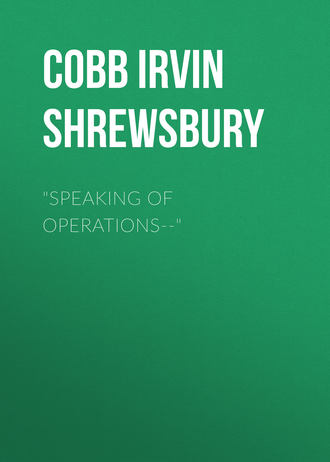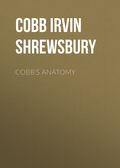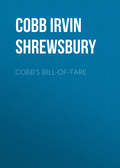
Cobb Irvin Shrewsbury
"Speaking of Operations--"
I remember a German tailor in Aix-la-Chapelle in the fall of 1914 who undertook to build for me a suit suitable for visiting the battle lines informally. He was the most literary tailor I ever met anywhere. He would drape the material over my person and then take a piece of chalk and write quite a nice long piece on me. Then he would rub it out and write it all over again, but more fully. He kept this up at intervals of every other day until he had writer's cramp. After that he used pins. He would pin the seams together, uttering little soothing, clucking sounds in German whenever a pin went through the goods and into me. The German cluck is not so soothing as the cluck of the English-speaking peoples, I find.
At the end of two long and trying weeks, which wore both of us down noticeably, he had the job done. It was not an unqualified success. He regarded is as a suit of clothes, but I knew better; it was a set of slip covers, and if only I had been a two-seated runabout it would have proved a perfect fit, I am sure; but I am a single-seated design and it did not answer. I wore it to the war because I had nothing else to wear that would stamp me as a regular war correspondent, except, of course, my wrist watch; but I shall not wear it to another war. War is terrible enough already; and, besides, I have parted with it. On my way home through Holland I gave that suit to a couple of poor Belgian refugees, and I presume they are still wearing it.
So far as I have been able to observe, the surgeons and the tailors of these times share but one common instinct: If you go to a new surgeon or to a new tailor he is morally certain, after looking you over, that the last surgeon you had or the last tailor, did not do your cutting properly. There, however, is where the resemblance ends. The tailor, as I remarked in effect just now, wants an hour at least in which to decide how he may best cover up and disguise the irregularities of the human form; in much less time than that the surgeon has completely altered the form itself.
With the surgeon it is very much as it is with those learned men who write those large, impressive works of reference which should be permanently in every library, and which we are forever buying from an agent because we are so passionately addicted to payments. If the thing he seeks does not appear in the contents proper he knows exactly where to look for it. "See appendix," says the historian to you in a footnote. "See appendix," says the surgeon to himself, the while humming a cheery refrain. And so he does.
Well, I went home. This was Tuesday and the operation was not to be performed until the coming Friday. By Wednesday I had calmed down considerably. By Thursday morning I was practically normal again as regards my nerves. You will understand that I was still in a blissful state of ignorance concerning the actual methods of the surgical profession as exemplified by its leading exponents of today. The knowledge I have touched on in the pages immediately preceding was to come to me later.
Likewise Doctor Z's manner had been deceiving. It could not be that he meant to carve me to any really noticeable extent—his attitude had been entirely too casual. At our house carving is a very serious matter. Any time I take the head of the table and start in to carve it is fitting women and children get to a place of safety, and onlookers should get under the table. When we first began housekeeping and gave our first small dinner-party we had a brace of ducks cooked in honor of the company, and I, as host, undertook to carve them. I never knew until then that a duck was built like a watch—that his works were inclosed in a burglarproof case. Without the use of dynamite the Red Leary-O'Brien gang could not have broken into those ducks. I thought so then and I think so yet. Years have passed since then, but I may state that even now, when there are guests for dinner, we do not have ducks. Unless somebody else is going to carve, we have liver.
I mention this fact in passing because it shows that I had learned to revere carving as one of the higher arts, and one not to be approached except in a spirit of due appreciation of the magnitude of the undertaking, and after proper consideration and thought and reflection, and all that sort of thing.
If this were true as regards a mere duck, why not all the more so as regards the carving of a person of whom I am so very fond as I am of myself? Thus I reasoned. And finally, had not Doctor Z spoken of the coming operation as a small matter? Well then?
Thursday at noon I received from Doctor Z's secretary a note stating that arrangements had been made for my admission into St. Germicide that same evening and that I was to spend the night there. This hardly seemed necessary. Still, the tone of the note appeared to indicate that the hospital authorities particularly wished to have me for an overnight guest; and as I reflected that probably the poor things had few enough bright spots in their busy lives, I decided I would humor them along and gladden the occasion with my presence from dinner-time on.
About eight o'clock I strolled in very jauntily. In my mind I had the whole programme mapped out. I would stay at the hospital for, say, two days following the operation—or, at most, three. Then I must be up and away. I had a good deal of work to do and a number of people to see on important business, and I could not really afford to waste more than a weekend on the staff of St. Germicide's. After Monday they must look to their own devices for social entertainment. That was my idea. Now when I look back on it I laugh, but it is a hollow laugh and there is no real merriment in it.
Indeed, almost from the moment of my entrance little things began to come up that were calculated to have a depressing effect on one's spirits. Downstairs a serious-looking lady met me and entered in a book a number of salient facts regarding my personality which the previous investigators had somehow overlooked. There is a lot of bookkeeping about an operation. This detail attended to, a young man, dressed in white garments and wearing an expression that stamped him as one who had suffered a recent deep bereavement came and relieved me of my hand bag and escorted me upstairs.
As we passed through the upper corridors I had my first introduction to the hospital smell, which is a smell compounded of iodoform, ether, gruel, and something boiling. All hospitals have it, I understand. In time you get used to it, but you never really care for it.
The young man led me into a small room tastefully decorated with four walls, a floor, a ceiling, a window sill and a window, a door and a doorsill, and a bed and a chair. He told me to go to bed. I did not want to go to bed—it was not my regular bedtime—but he made a point of it, and I judged it was according to regulations; so I undressed and put on my night clothes and crawled in. He left me, taking my other clothes and my shoes with him, but I was not allowed to get lonely.
A little later a ward surgeon appeared, to put a few inquiries of a pointed and personal nature. He particularly desired to know what my trouble was. I explained to him that I couldn't tell him—he would have to see Doctor X or Doctor Z; they probably knew, but were keeping it a secret between themselves.
The answer apparently satisfied him, because immediately after that he made me sign a paper in which I assumed all responsibility for what was to take place the next morning.
This did not seem exactly fair. As I pointed out to him, it was the surgeon's affair, not mine; and if the surgeon made a mistake the joke would be on him and not on me, because in that case I would not be here anyhow. But I signed, as requested, on the dotted line, and he departed.
After that, at intervals, the chief house surgeon dropped in, without knocking, and the head nurse came, and an interne or so, and a ward nurse, and the special nurse who was to have direct charge of me. It dawned on me that I was not having any more privacy in that hospital than a goldfish.
About eleven o'clock an orderly came, and, without consulting my wishes in the matter, he undressed me until I could have passed almost anywhere for September Morn's father, and gave me a clean shave, twice over, on one of my most prominent plane surfaces. I must confess I enjoyed that part of it. So far as I am able to recall, it was the only shave I have ever had where the operator did not spray me with cheap perfumery afterward and then try to sell me a bottle of hair tonic.
Having shaved me, the young man did me up amidships in a neat cloth parcel, took his kit under his arm and went away.
It occurred to me that, considering the trivial nature of the case, a good deal of fuss was being made over me by persons who could have no personal concern in the matter whatsoever. This thought recurred to me frequently as I lay there all tied in a bundle like a week's washing. I did not feel quite so uppish as I had felt. Why was everybody picking on me?
Anon I slept, but dreamed fitfully. I dreamed that a whole flock of surgeons came to my bedside and charted me out in sections, like one of those diagram pictures you see of a beef in the Handy Compendium of Universal Knowledge, showing the various cuts and the butcher's pet name for each cut. Each man took his favorite joint and carried it away, and when they were all gone I was merely a recent site, full of reverberating echoes and nothing else.
I have had happier dreams in my time; this was not the kind of dream I should have selected had the choice been left to me.
When I woke the young sun was shining in at the window, and an orderly—not the orderly who had shaved me, but another one—was there in my room and my nurse was waiting outside the door. The orderly dressed me in a quaint suit of pyjamas cut on the half shell and buttoning stylishly in the back, princesse mode. Then he rolled in a flat litter on wheels and stretched me on it, and covered me up with a white tablecloth, just as though I had been cold Sunday-night supper, and we started for the operating-room at the top of the building; but before we started I lit a large black cigar, as Gen. U. S. Grant used to do when he went into battle. I wished by this to show how indifferent I was. Maybe he fooled somebody, but I do not believe I possess the same powers of simulation that Grant had. He must have been a very remarkable man—Grant must.







